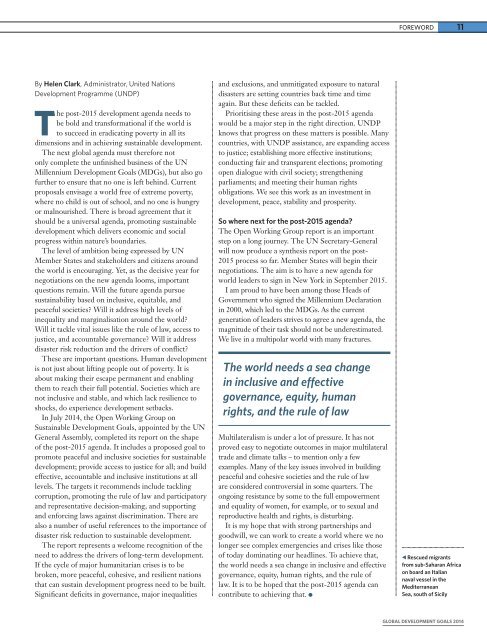FAMBB
FAMBB
FAMBB
You also want an ePaper? Increase the reach of your titles
YUMPU automatically turns print PDFs into web optimized ePapers that Google loves.
FOREWORD11By Helen Clark, Administrator, United NationsDevelopment Programme (UNDP)The post-2015 development agenda needs tobe bold and transformational if the world isto succeed in eradicating poverty in all itsdimensions and in achieving sustainable development.The next global agenda must therefore notonly complete the unfinished business of the UNMillennium Development Goals (MDGs), but also gofurther to ensure that no one is left behind. Currentproposals envisage a world free of extreme poverty,where no child is out of school, and no one is hungryor malnourished. There is broad agreement that itshould be a universal agenda, promoting sustainabledevelopment which delivers economic and socialprogress within nature’s boundaries.The level of ambition being expressed by UNMember States and stakeholders and citizens aroundthe world is encouraging. Yet, as the decisive year fornegotiations on the new agenda looms, importantquestions remain. Will the future agenda pursuesustainability based on inclusive, equitable, andpeaceful societies? Will it address high levels ofinequality and marginalisation around the world?Will it tackle vital issues like the rule of law, access tojustice, and accountable governance? Will it addressdisaster risk reduction and the drivers of conflict?These are important questions. Human developmentis not just about lifting people out of poverty. It isabout making their escape permanent and enablingthem to reach their full potential. Societies which arenot inclusive and stable, and which lack resilience toshocks, do experience development setbacks.In July 2014, the Open Working Group onSustainable Development Goals, appointed by the UNGeneral Assembly, completed its report on the shapeof the post-2015 agenda. It includes a proposed goal topromote peaceful and inclusive societies for sustainabledevelopment; provide access to justice for all; and buildeffective, accountable and inclusive institutions at alllevels. The targets it recommends include tacklingcorruption, promoting the rule of law and participatoryand representative decision-making, and supportingand enforcing laws against discrimination. There arealso a number of useful references to the importance ofdisaster risk reduction to sustainable development.The report represents a welcome recognition of theneed to address the drivers of long-term development.If the cycle of major humanitarian crises is to bebroken, more peaceful, cohesive, and resilient nationsthat can sustain development progress need to be built.Significant deficits in governance, major inequalitiesand exclusions, and unmitigated exposure to naturaldisasters are setting countries back time and timeagain. But these deficits can be tackled.Prioritising these areas in the post-2015 agendawould be a major step in the right direction. UNDPknows that progress on these matters is possible. Manycountries, with UNDP assistance, are expanding accessto justice; establishing more effective institutions;conducting fair and transparent elections; promotingopen dialogue with civil society; strengtheningparliaments; and meeting their human rightsobligations. We see this work as an investment indevelopment, peace, stability and prosperity.So where next for the post-2015 agenda?The Open Working Group report is an importantstep on a long journey. The UN Secretary-Generalwill now produce a synthesis report on the post-2015 process so far. Member States will begin theirnegotiations. The aim is to have a new agenda forworld leaders to sign in New York in September 2015.I am proud to have been among those Heads ofGovernment who signed the Millennium Declarationin 2000, which led to the MDGs. As the currentgeneration of leaders strives to agree a new agenda, themagnitude of their task should not be underestimated.We live in a multipolar world with many fractures.The world needs a sea changein inclusive and effectivegovernance, equity, humanrights, and the rule of lawMultilateralism is under a lot of pressure. It has notproved easy to negotiate outcomes in major multilateraltrade and climate talks – to mention only a fewexamples. Many of the key issues involved in buildingpeaceful and cohesive societies and the rule of laware considered controversial in some quarters. Theongoing resistance by some to the full empowermentand equality of women, for example, or to sexual andreproductive health and rights, is disturbing.It is my hope that with strong partnerships andgoodwill, we can work to create a world where we nolonger see complex emergencies and crises like thoseof today dominating our headlines. To achieve that,the world needs a sea change in inclusive and effectivegovernance, equity, human rights, and the rule oflaw. It is to be hoped that the post-2015 agenda cancontribute to achieving that.Rescued migrantsfrom sub-Saharan Africaon board an Italiannaval vessel in theMediterraneanSea, south of SicilyGLOBAL DEVELOPMENT GOALS 2014


